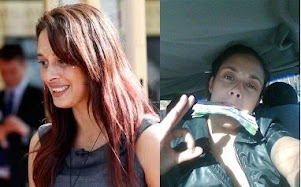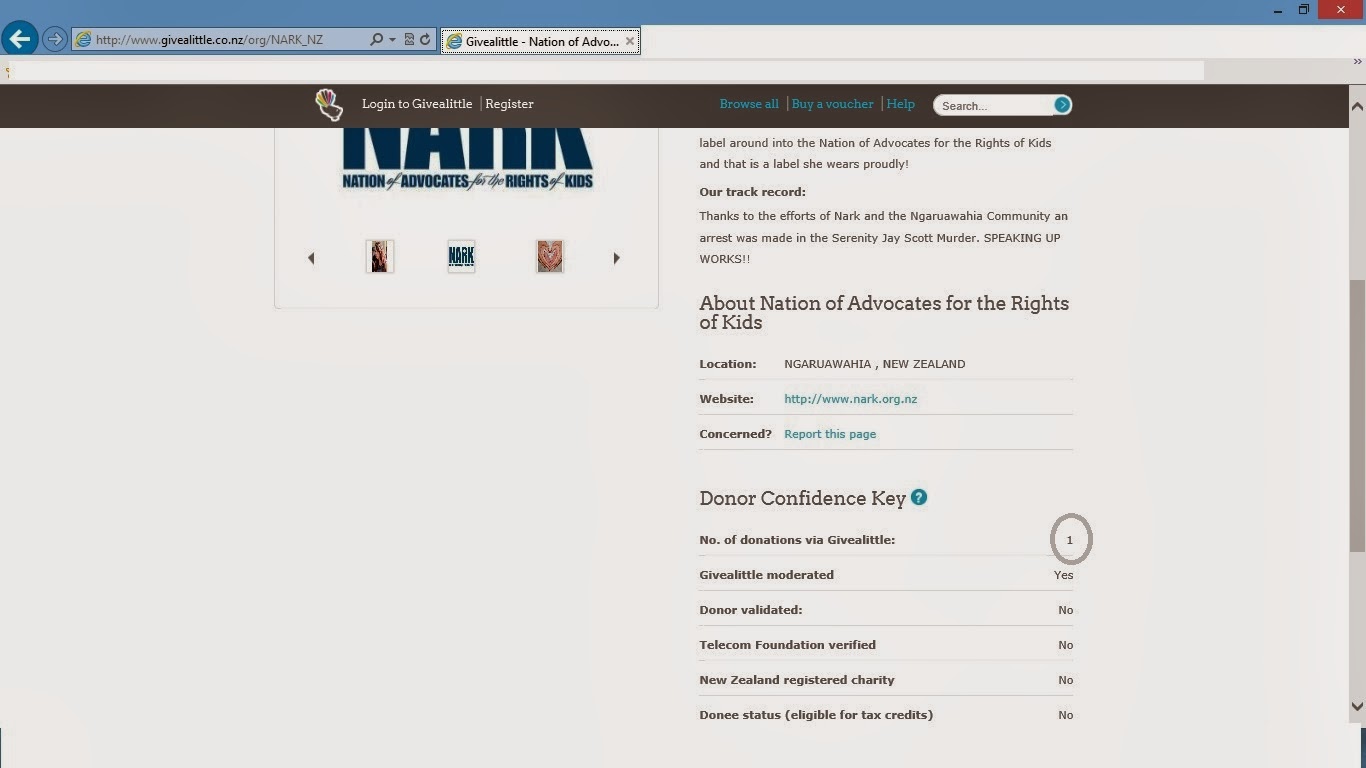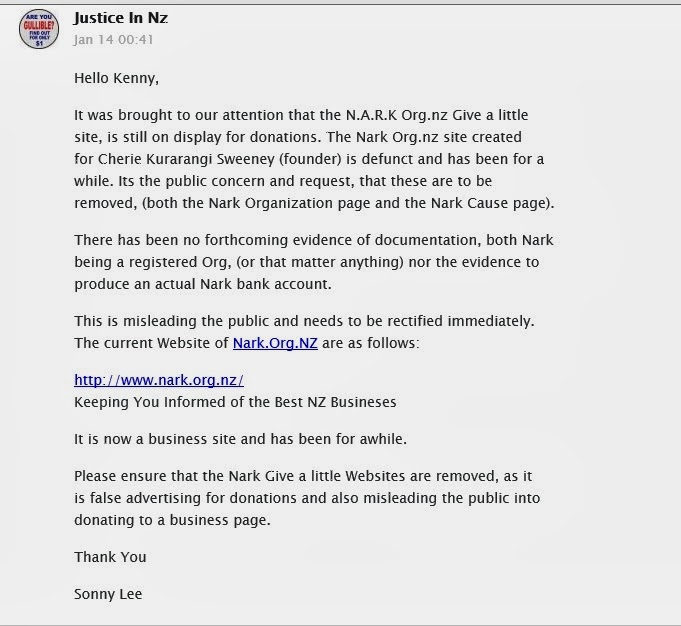2009 Ms Cheriek Kara (Sweeney) and Exploitation
From the achieves:
In 2009 a documentary was created by TV3 60 minutes regarding girl gangs in Hastings. A huge issue was centred around the filming of the Documentary and also of "alleged" alcohol involvement.
No substantial evidence was forthcoming.
It was found that the TV3 60 minute documentary did breach privacy laws and not protecting the identities of the girls who's ages were aged 12 or 13, two aged 15 and one aged 16yrs of age.
The full BSA Complaint and final decision can be accessed on the Hastings District Council and TV Works LTD 2009-088 link above.
Here is an article also about this:
--------------------------------------------------------------------------------------------------------
BSA finds girls treated unfairly in gangs item
1:00 PM Tuesday Mar 9, 2010
A TV3 60 Minutes item on girl gangs in Hawke's Bay did not sufficiently protect the identities of four girls, exploited them and treated them unfairly, the Broadcasting Standards Authority has found.
The broadcaster has been ordered to make an on-air apology and pay $6000 costs.
Hastings District Council complained about the item, which contained interviews with current and former gang members and was broadcast on April 27 last year.
Included in the item were four girls - one aged 12 or 13, two aged 15 and one aged 16 - who were shown wearing gang-style clothing. Two of the girls were shown spray painting graffiti on a basketball court and two were shown re-enacting breaking into a house.
The girls were not interviewed but the reporter said they had told her they were drinking and getting into fights.
Two of the council's six complaints were upheld, with the authority finding breaches of the privacy and fairness standards.
The four girls were shown with their faces covered by bandanas but during the item three of the bandanas slipped, exposing the girls' faces.
The authority said that even if the bandanas had not slipped, it did not agree with the broadcaster that they provided sufficient protection of their identity.
"Viewers could see the top half of the girls' faces including their eyes, nose and hair colour. In addition, several full length shots of the girls showed their body shapes and distinctive clothing," the decision said.
The three girls under 16 were not old enough to consent to a broadcast that would breach their privacy the decision said and, "there is no evidence to suggest that a parent or guardian consented on their behalf..."
In the case of the 16-year-old, there was an understanding with the reporter that her identity would not be revealed and the authority did not find the bandana to be a sufficient disguise.
"The authority considers that the broadcaster reneged on an understanding not to reveal the girls' identities, and thereby disclosed private facts in a highly offensive manner about four young girls, three of whom were children," the decision said.
On the issue of unfairness, the decision said that the young girls were exposed as participating in criminal and anti-social behaviour when the broadcaster had agreed not to identify them.
The authority found the broadcaster failed to appreciate the harm the item could cause to the reputations and futures of the young girls.
"In this respect, the authority is of the view that the broadcast exploited the girls, due to their young age and lack of appreciation for the consequences of their actions, and unnecessarily identified them. It considers that all four girls were treated unfairly."
The authority ordered TVWorks Ltd to broadcast a summary of the decision within a month and to pay complainant costs of $3560.12 and Crown costs of $2500.
- NZPA
Another article in the 3 News NZ website. Please click in the link.
---------------------------------------------------------------------------------------------------------------------
---------------------------------------------------------------------------------------------------------------------
Mrs Roberta Karangaroa's input on this issue and also that she had "heard" alcohol was being provided to the girls by the 60 minutes crew during filming.
TV team in booze row
2:00 PM Friday May 1, 2009
Television news show 60 Minutes denies allegations it bought alcohol for a group of young Hawke's Bay women interviewed for its story Girls in the Hood which screened on TV3 on Sunday.
Instead, the producer of the show said the 60 Minutes team was invited to attend a party and took along a small quantity of alcohol "in the customary way".
Executive producer Terrence Taylor said the party was held by an adult and took place after all the interviews had been completed.
"No other alcohol was given to anyone," he said in written replies to Hawke's Bay Today.
Hastings Mayor Lawrence Yule said he was disappointed with the way the story on girl gangs portrayed Hastings, Napier and in particular Flaxmere.
"I'm just trying to stand up for a part of my community that has been shafted by a journalist from outside the area," he said.
Mr Yule said it had appeared to him the young girls interviewed had been supplied alcohol as a prop for the story. They were filmed drinking a bottle of Johnny Walker whisky.
Today he was meeting Riverslea Community Trust spokeswoman Roberta Karangaroa to talk about their options, which may include a complaint to the New Zealand Press Council.
Ms Karangaroa, who works with youth, said she also had heard a bottle of alcohol had been bought by 60 Minutes and given to the girls to drink while they were filmed for the story.
Mr Yule and Ms Karangaroa were upset the girls had been asked to re-enact a burglary on the show.
Mr Taylor said the girls 60 Minutes interviewed did act out a burglary scene but re-enactments were often used in current affairs shows.
" ... and we are sure that viewers would see from the way it was filmed that this was clearly re-enacted," he said.
Mr Taylor said 60 Minutes did not say there were limited services available to help girls in gangs back on to the straight and narrow.
"A participant in the story, a knowledgeable expert on girl 'crews', suggested that young women are attracted to these groups because they don't receive enough support elsewhere.
This was her honest opinion," he said.
Mr Taylor said the 60 Minutes team did seek comment from the Maori community in the course of researching the story.
"We spoke to a community group, who agreed that girl crews are a problem in the area," he said.
"We stand by the story, which we believe highlighted a serious issue. In the light of the interest that it seems to have created, we are considering returning to do a follow-up," he said.
Obscene language had been displayed on the 60 Minutes website from bloggers leaving comments about the Girls in the Hood story.
--------------------------------------------------------------------------------------------------------
And here are the paragraphs related to Ms Cheriek Kara (Sweeney) from the BSA site.
-------------------------------------------------------------------------------------------------------------
Cherie Kurarangi Sweeney was known as a fixer (paid as an assistant). As pointed out, she received $1,000 dollars for this job. This is something she had stated last year that, she had done this on a voluntary basis. Here is her admittance of being involved:
From her post she had said:
"I helped girlgangs that were causing havoc in our communities as I felt that these girls could be helped if pointed in the right direction. "This was ALL voluntary."
More from our previous post of this is issue here
From the BSA website:
Complainant
[24] The HDC argued that the programme’s makers had relied on one of the women interviewed to conduct research for the item, including interviewing the mayor and local MPs, but it noted that none of this “research” occurred. It said that the broadcaster had told the HDC that the woman was an assistant producer who owned her own media company, and alleged that she was paid $1,000 for organising the story. The complainant considered the woman to be unreliable and stated that the broadcaster had taken no steps to check what research she had done.
The Broadcasters Response
[43] Turning to the $1000 payment made to one of the women for organising the story, the broadcaster stated that the woman ran her own company and had worked for the media in the past. It said she was paid as an assistant or “fixer” to introduce the reporter to people in the area. TVWorks considered that the payment was “entirely legitimate” and reasonable considering her knowledge of girl gangs. It stated that another of the women interviewed had been paid $200 plus a small sum of lunch money for her and the other girls being filmed. It said that the woman’s car had been used in several scenes and that the reporter had “filled the tank”.
Authority's Determination
Contracting the “fixer” and the nature of the item overall
[101] With respect to 60 Minutes’ use of a “fixer”, the Authority is satisfied with TVWorks’ explanation of why it employed a person to make contacts for the reporter so that she could conduct interviews and obtain other material for the story.
Why would she again lie about this being voluntary?
--------------------------------------------------------------------------------------------------------
Hawke's Bay Today
Former gang girl hits back
1:49 PM Thursday Apr 30, 2009
 A former female gang member who featured on a 60 Minutes television documentary about Flaxmere's girl gangs wants to meet Hastings Mayor Lawrence Yule to discuss comments he made about it.
A former female gang member who featured on a 60 Minutes television documentary about Flaxmere's girl gangs wants to meet Hastings Mayor Lawrence Yule to discuss comments he made about it.Cheriek Kara, a mother of two who is working towards her master's degree in Maori and management, featured as a reformed teen gang member on the current affairs show alongside present gang members trying to change their lifestyles.
She slammed comments made by Mr Yule yesterday about the story being a "beat up" that showed Flaxmere in a negative light.
"Overall, I believe the documentary was positive," Miss Kara said.
"Yes, there were some rough and raw girls, but the documentary showed their development so far.
"It may not seem like much of a development to the people who have fingers in their ears and have a 'normal life', but they have come a long way."
Miss Kara said the documentary showed that there were about 200 girls involved with the local "cliques" or gangs.
This morning she said "every single one of them want to change" and they just needed the resources to do so. And although there were people within the community willing to help, funding was not easy to come by.
Miss Kara said a meeting between her, local dignitaries who have an insight into the gang culture, and some of the girls involved in gangs, could provide some enlightenment.
Mr Yule said this morning he would write to 60 Minutes outlining concerns that the situation in Flaxmere was portrayed incorrectly.
Miss Kara has received 22 letters of support since the screening.
Writers included Maori Affairs minister Pita Sharples and Hastings Girls' High School.
Another, from Dannevirke High School, requested a visit from 21-year-old PT, who featured in the story as a gang member hoping to become a youth worker.
---------------------------------------------------------------------------------------------------------------------
She had also stated in this Media article that....
"Cheriek Kara, a mother of two who is working towards her master's degree in Maori and management, featured as a reformed teen gang member on the current affairs show alongside present gang members trying to change their lifestyles."
When asked if she had completed her studies and gained her Masters Degree, nothing was produced.
This picture was given by a close family member who posted this one of the many pages that Ms Cherie had removed.
When it comes to exploitation of monies for her "causes" she certainly makes sure to get paid.
 |
| Cherie and Michael |
There is more to this story which will be posted in due time.













